Australian Identity in Nursing
VerifiedAdded on 2022/08/25
|11
|3109
|14
Assignment
AI Summary
Contribute Materials
Your contribution can guide someone’s learning journey. Share your
documents today.
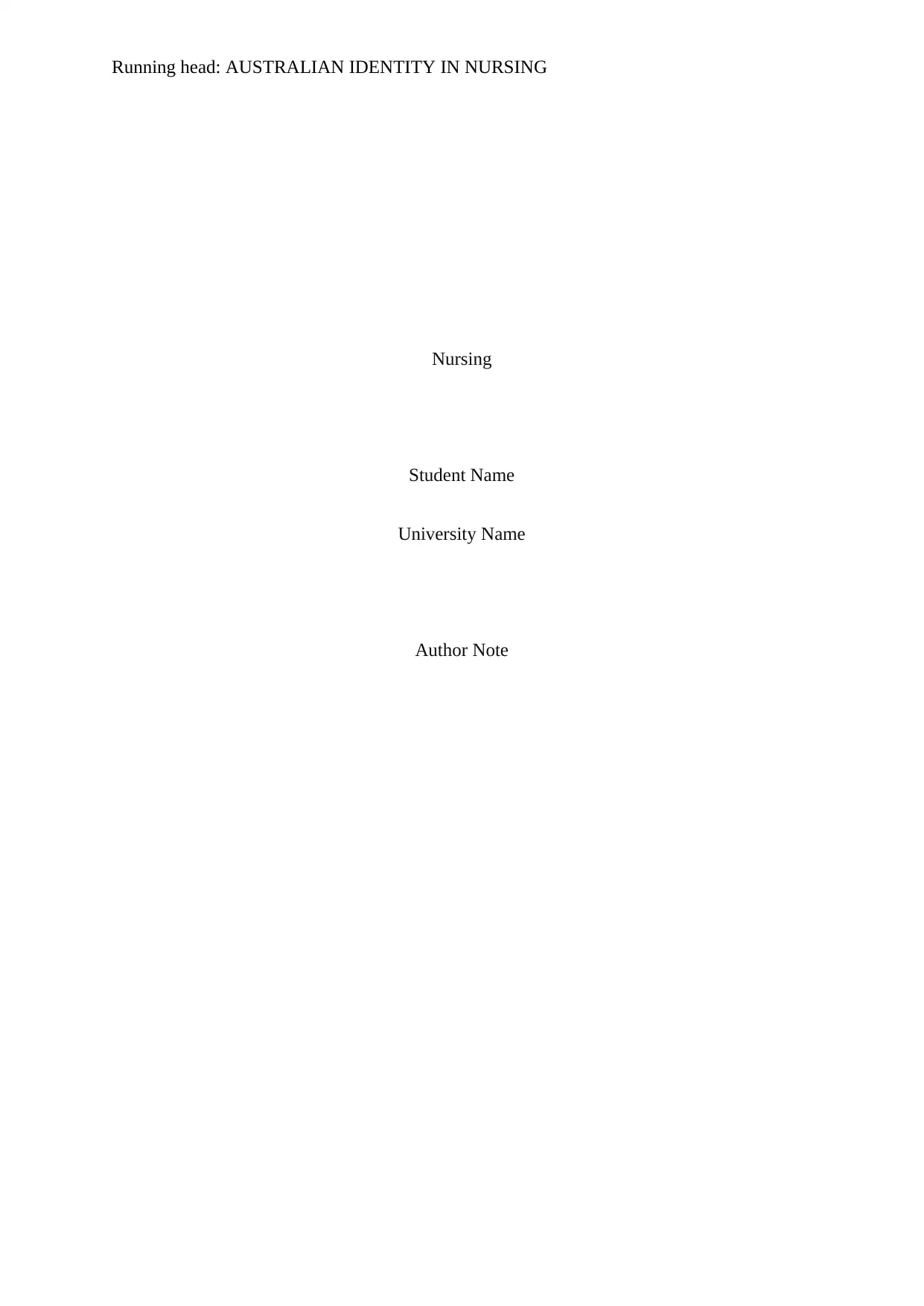
Running head: AUSTRALIAN IDENTITY IN NURSING
Nursing
Student Name
University Name
Author Note
Nursing
Student Name
University Name
Author Note
Secure Best Marks with AI Grader
Need help grading? Try our AI Grader for instant feedback on your assignments.
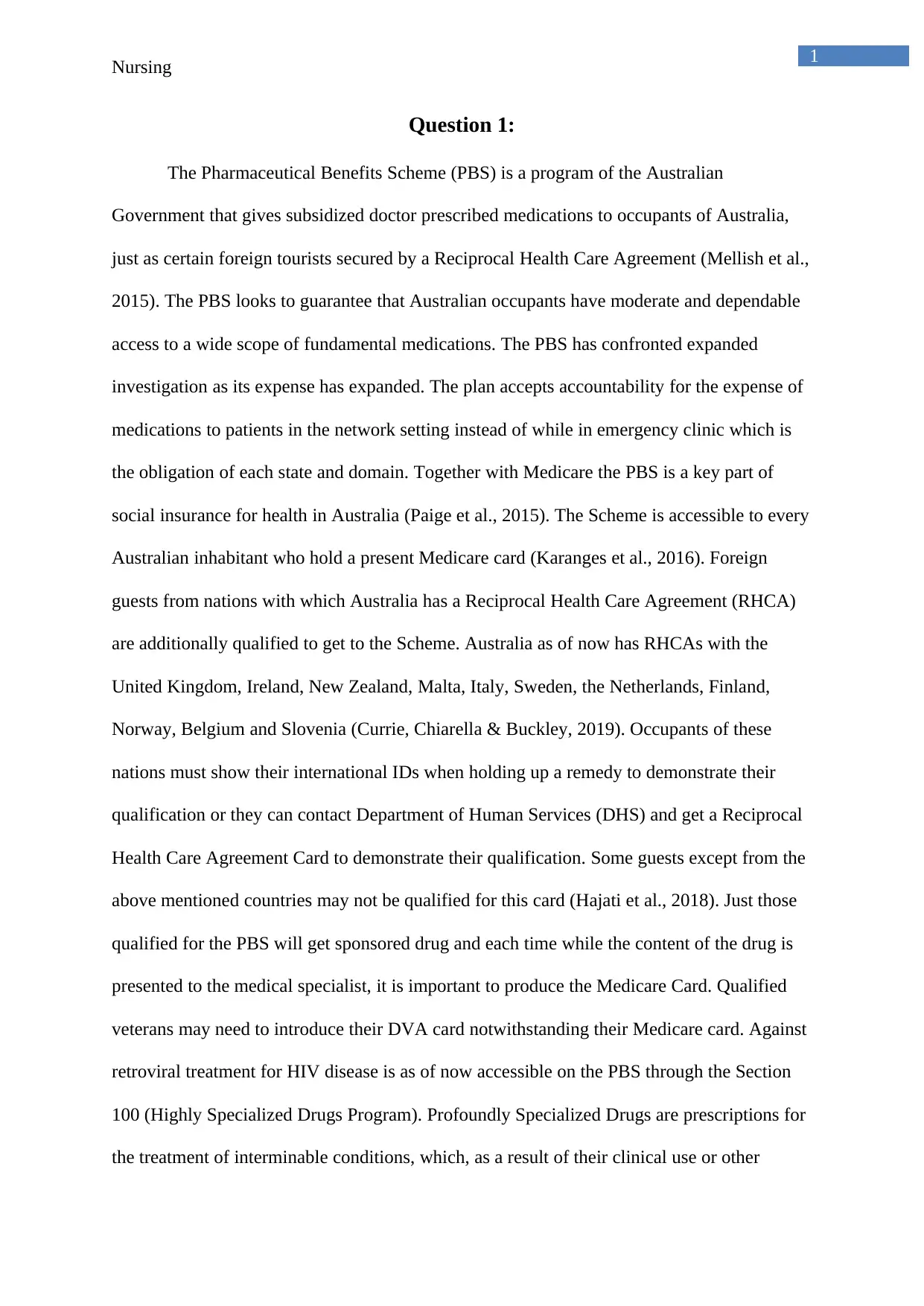
1
Nursing
Question 1:
The Pharmaceutical Benefits Scheme (PBS) is a program of the Australian
Government that gives subsidized doctor prescribed medications to occupants of Australia,
just as certain foreign tourists secured by a Reciprocal Health Care Agreement (Mellish et al.,
2015). The PBS looks to guarantee that Australian occupants have moderate and dependable
access to a wide scope of fundamental medications. The PBS has confronted expanded
investigation as its expense has expanded. The plan accepts accountability for the expense of
medications to patients in the network setting instead of while in emergency clinic which is
the obligation of each state and domain. Together with Medicare the PBS is a key part of
social insurance for health in Australia (Paige et al., 2015). The Scheme is accessible to every
Australian inhabitant who hold a present Medicare card (Karanges et al., 2016). Foreign
guests from nations with which Australia has a Reciprocal Health Care Agreement (RHCA)
are additionally qualified to get to the Scheme. Australia as of now has RHCAs with the
United Kingdom, Ireland, New Zealand, Malta, Italy, Sweden, the Netherlands, Finland,
Norway, Belgium and Slovenia (Currie, Chiarella & Buckley, 2019). Occupants of these
nations must show their international IDs when holding up a remedy to demonstrate their
qualification or they can contact Department of Human Services (DHS) and get a Reciprocal
Health Care Agreement Card to demonstrate their qualification. Some guests except from the
above mentioned countries may not be qualified for this card (Hajati et al., 2018). Just those
qualified for the PBS will get sponsored drug and each time while the content of the drug is
presented to the medical specialist, it is important to produce the Medicare Card. Qualified
veterans may need to introduce their DVA card notwithstanding their Medicare card. Against
retroviral treatment for HIV disease is as of now accessible on the PBS through the Section
100 (Highly Specialized Drugs Program). Profoundly Specialized Drugs are prescriptions for
the treatment of interminable conditions, which, as a result of their clinical use or other
Nursing
Question 1:
The Pharmaceutical Benefits Scheme (PBS) is a program of the Australian
Government that gives subsidized doctor prescribed medications to occupants of Australia,
just as certain foreign tourists secured by a Reciprocal Health Care Agreement (Mellish et al.,
2015). The PBS looks to guarantee that Australian occupants have moderate and dependable
access to a wide scope of fundamental medications. The PBS has confronted expanded
investigation as its expense has expanded. The plan accepts accountability for the expense of
medications to patients in the network setting instead of while in emergency clinic which is
the obligation of each state and domain. Together with Medicare the PBS is a key part of
social insurance for health in Australia (Paige et al., 2015). The Scheme is accessible to every
Australian inhabitant who hold a present Medicare card (Karanges et al., 2016). Foreign
guests from nations with which Australia has a Reciprocal Health Care Agreement (RHCA)
are additionally qualified to get to the Scheme. Australia as of now has RHCAs with the
United Kingdom, Ireland, New Zealand, Malta, Italy, Sweden, the Netherlands, Finland,
Norway, Belgium and Slovenia (Currie, Chiarella & Buckley, 2019). Occupants of these
nations must show their international IDs when holding up a remedy to demonstrate their
qualification or they can contact Department of Human Services (DHS) and get a Reciprocal
Health Care Agreement Card to demonstrate their qualification. Some guests except from the
above mentioned countries may not be qualified for this card (Hajati et al., 2018). Just those
qualified for the PBS will get sponsored drug and each time while the content of the drug is
presented to the medical specialist, it is important to produce the Medicare Card. Qualified
veterans may need to introduce their DVA card notwithstanding their Medicare card. Against
retroviral treatment for HIV disease is as of now accessible on the PBS through the Section
100 (Highly Specialized Drugs Program). Profoundly Specialized Drugs are prescriptions for
the treatment of interminable conditions, which, as a result of their clinical use or other
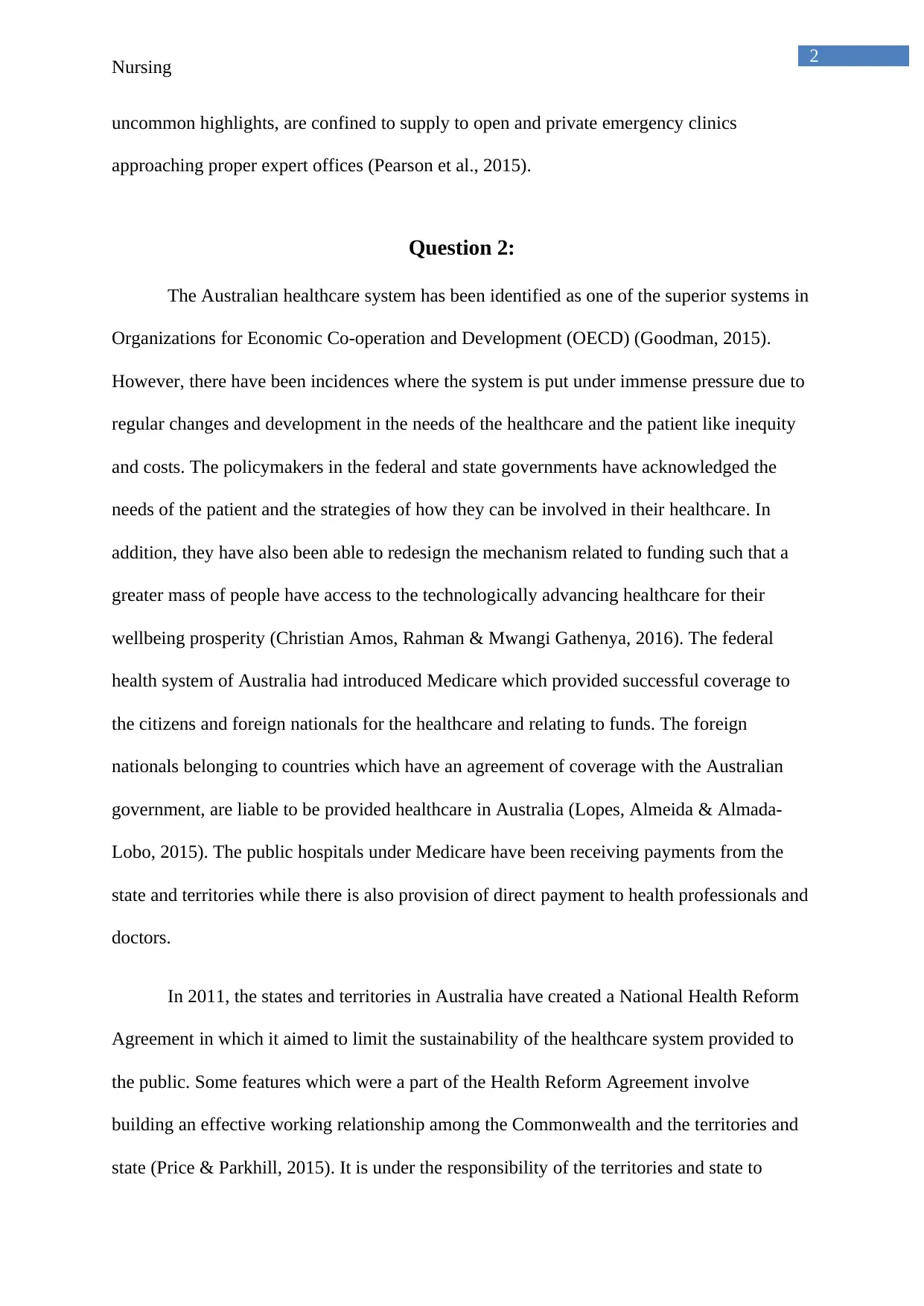
2
Nursing
uncommon highlights, are confined to supply to open and private emergency clinics
approaching proper expert offices (Pearson et al., 2015).
Question 2:
The Australian healthcare system has been identified as one of the superior systems in
Organizations for Economic Co-operation and Development (OECD) (Goodman, 2015).
However, there have been incidences where the system is put under immense pressure due to
regular changes and development in the needs of the healthcare and the patient like inequity
and costs. The policymakers in the federal and state governments have acknowledged the
needs of the patient and the strategies of how they can be involved in their healthcare. In
addition, they have also been able to redesign the mechanism related to funding such that a
greater mass of people have access to the technologically advancing healthcare for their
wellbeing prosperity (Christian Amos, Rahman & Mwangi Gathenya, 2016). The federal
health system of Australia had introduced Medicare which provided successful coverage to
the citizens and foreign nationals for the healthcare and relating to funds. The foreign
nationals belonging to countries which have an agreement of coverage with the Australian
government, are liable to be provided healthcare in Australia (Lopes, Almeida & Almada-
Lobo, 2015). The public hospitals under Medicare have been receiving payments from the
state and territories while there is also provision of direct payment to health professionals and
doctors.
In 2011, the states and territories in Australia have created a National Health Reform
Agreement in which it aimed to limit the sustainability of the healthcare system provided to
the public. Some features which were a part of the Health Reform Agreement involve
building an effective working relationship among the Commonwealth and the territories and
state (Price & Parkhill, 2015). It is under the responsibility of the territories and state to
Nursing
uncommon highlights, are confined to supply to open and private emergency clinics
approaching proper expert offices (Pearson et al., 2015).
Question 2:
The Australian healthcare system has been identified as one of the superior systems in
Organizations for Economic Co-operation and Development (OECD) (Goodman, 2015).
However, there have been incidences where the system is put under immense pressure due to
regular changes and development in the needs of the healthcare and the patient like inequity
and costs. The policymakers in the federal and state governments have acknowledged the
needs of the patient and the strategies of how they can be involved in their healthcare. In
addition, they have also been able to redesign the mechanism related to funding such that a
greater mass of people have access to the technologically advancing healthcare for their
wellbeing prosperity (Christian Amos, Rahman & Mwangi Gathenya, 2016). The federal
health system of Australia had introduced Medicare which provided successful coverage to
the citizens and foreign nationals for the healthcare and relating to funds. The foreign
nationals belonging to countries which have an agreement of coverage with the Australian
government, are liable to be provided healthcare in Australia (Lopes, Almeida & Almada-
Lobo, 2015). The public hospitals under Medicare have been receiving payments from the
state and territories while there is also provision of direct payment to health professionals and
doctors.
In 2011, the states and territories in Australia have created a National Health Reform
Agreement in which it aimed to limit the sustainability of the healthcare system provided to
the public. Some features which were a part of the Health Reform Agreement involve
building an effective working relationship among the Commonwealth and the territories and
state (Price & Parkhill, 2015). It is under the responsibility of the territories and state to
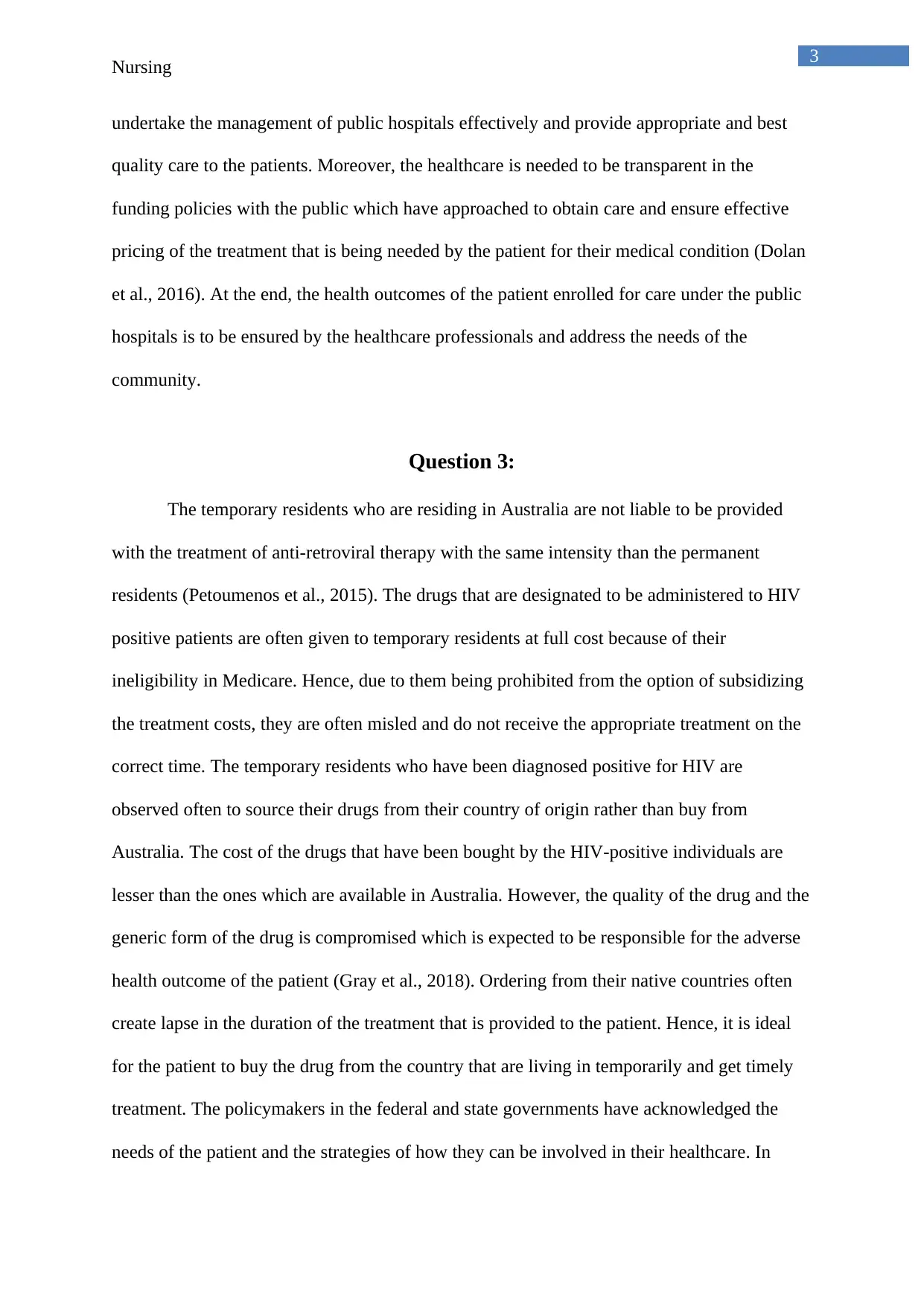
3
Nursing
undertake the management of public hospitals effectively and provide appropriate and best
quality care to the patients. Moreover, the healthcare is needed to be transparent in the
funding policies with the public which have approached to obtain care and ensure effective
pricing of the treatment that is being needed by the patient for their medical condition (Dolan
et al., 2016). At the end, the health outcomes of the patient enrolled for care under the public
hospitals is to be ensured by the healthcare professionals and address the needs of the
community.
Question 3:
The temporary residents who are residing in Australia are not liable to be provided
with the treatment of anti-retroviral therapy with the same intensity than the permanent
residents (Petoumenos et al., 2015). The drugs that are designated to be administered to HIV
positive patients are often given to temporary residents at full cost because of their
ineligibility in Medicare. Hence, due to them being prohibited from the option of subsidizing
the treatment costs, they are often misled and do not receive the appropriate treatment on the
correct time. The temporary residents who have been diagnosed positive for HIV are
observed often to source their drugs from their country of origin rather than buy from
Australia. The cost of the drugs that have been bought by the HIV-positive individuals are
lesser than the ones which are available in Australia. However, the quality of the drug and the
generic form of the drug is compromised which is expected to be responsible for the adverse
health outcome of the patient (Gray et al., 2018). Ordering from their native countries often
create lapse in the duration of the treatment that is provided to the patient. Hence, it is ideal
for the patient to buy the drug from the country that are living in temporarily and get timely
treatment. The policymakers in the federal and state governments have acknowledged the
needs of the patient and the strategies of how they can be involved in their healthcare. In
Nursing
undertake the management of public hospitals effectively and provide appropriate and best
quality care to the patients. Moreover, the healthcare is needed to be transparent in the
funding policies with the public which have approached to obtain care and ensure effective
pricing of the treatment that is being needed by the patient for their medical condition (Dolan
et al., 2016). At the end, the health outcomes of the patient enrolled for care under the public
hospitals is to be ensured by the healthcare professionals and address the needs of the
community.
Question 3:
The temporary residents who are residing in Australia are not liable to be provided
with the treatment of anti-retroviral therapy with the same intensity than the permanent
residents (Petoumenos et al., 2015). The drugs that are designated to be administered to HIV
positive patients are often given to temporary residents at full cost because of their
ineligibility in Medicare. Hence, due to them being prohibited from the option of subsidizing
the treatment costs, they are often misled and do not receive the appropriate treatment on the
correct time. The temporary residents who have been diagnosed positive for HIV are
observed often to source their drugs from their country of origin rather than buy from
Australia. The cost of the drugs that have been bought by the HIV-positive individuals are
lesser than the ones which are available in Australia. However, the quality of the drug and the
generic form of the drug is compromised which is expected to be responsible for the adverse
health outcome of the patient (Gray et al., 2018). Ordering from their native countries often
create lapse in the duration of the treatment that is provided to the patient. Hence, it is ideal
for the patient to buy the drug from the country that are living in temporarily and get timely
treatment. The policymakers in the federal and state governments have acknowledged the
needs of the patient and the strategies of how they can be involved in their healthcare. In
Secure Best Marks with AI Grader
Need help grading? Try our AI Grader for instant feedback on your assignments.
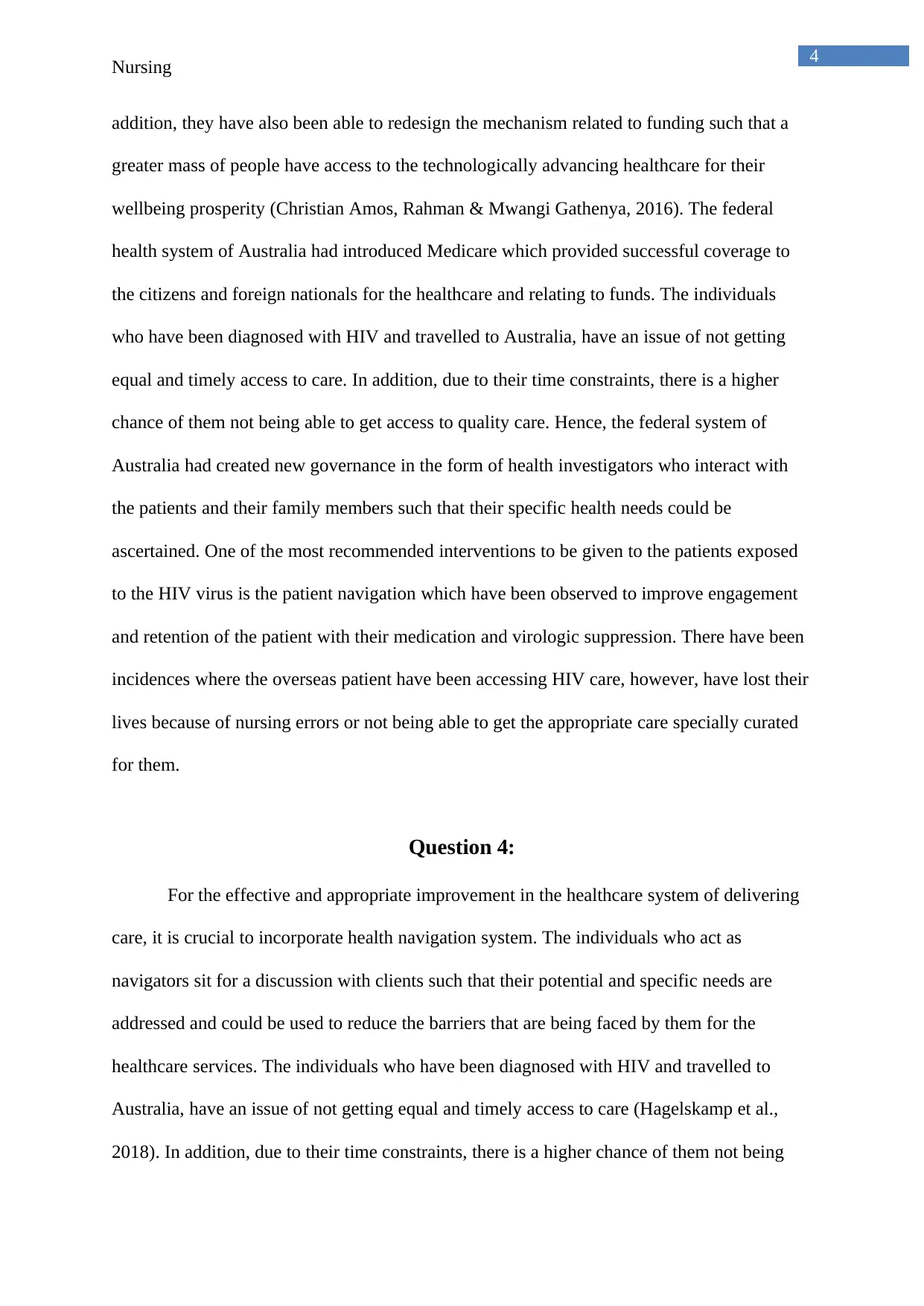
4
Nursing
addition, they have also been able to redesign the mechanism related to funding such that a
greater mass of people have access to the technologically advancing healthcare for their
wellbeing prosperity (Christian Amos, Rahman & Mwangi Gathenya, 2016). The federal
health system of Australia had introduced Medicare which provided successful coverage to
the citizens and foreign nationals for the healthcare and relating to funds. The individuals
who have been diagnosed with HIV and travelled to Australia, have an issue of not getting
equal and timely access to care. In addition, due to their time constraints, there is a higher
chance of them not being able to get access to quality care. Hence, the federal system of
Australia had created new governance in the form of health investigators who interact with
the patients and their family members such that their specific health needs could be
ascertained. One of the most recommended interventions to be given to the patients exposed
to the HIV virus is the patient navigation which have been observed to improve engagement
and retention of the patient with their medication and virologic suppression. There have been
incidences where the overseas patient have been accessing HIV care, however, have lost their
lives because of nursing errors or not being able to get the appropriate care specially curated
for them.
Question 4:
For the effective and appropriate improvement in the healthcare system of delivering
care, it is crucial to incorporate health navigation system. The individuals who act as
navigators sit for a discussion with clients such that their potential and specific needs are
addressed and could be used to reduce the barriers that are being faced by them for the
healthcare services. The individuals who have been diagnosed with HIV and travelled to
Australia, have an issue of not getting equal and timely access to care (Hagelskamp et al.,
2018). In addition, due to their time constraints, there is a higher chance of them not being
Nursing
addition, they have also been able to redesign the mechanism related to funding such that a
greater mass of people have access to the technologically advancing healthcare for their
wellbeing prosperity (Christian Amos, Rahman & Mwangi Gathenya, 2016). The federal
health system of Australia had introduced Medicare which provided successful coverage to
the citizens and foreign nationals for the healthcare and relating to funds. The individuals
who have been diagnosed with HIV and travelled to Australia, have an issue of not getting
equal and timely access to care. In addition, due to their time constraints, there is a higher
chance of them not being able to get access to quality care. Hence, the federal system of
Australia had created new governance in the form of health investigators who interact with
the patients and their family members such that their specific health needs could be
ascertained. One of the most recommended interventions to be given to the patients exposed
to the HIV virus is the patient navigation which have been observed to improve engagement
and retention of the patient with their medication and virologic suppression. There have been
incidences where the overseas patient have been accessing HIV care, however, have lost their
lives because of nursing errors or not being able to get the appropriate care specially curated
for them.
Question 4:
For the effective and appropriate improvement in the healthcare system of delivering
care, it is crucial to incorporate health navigation system. The individuals who act as
navigators sit for a discussion with clients such that their potential and specific needs are
addressed and could be used to reduce the barriers that are being faced by them for the
healthcare services. The individuals who have been diagnosed with HIV and travelled to
Australia, have an issue of not getting equal and timely access to care (Hagelskamp et al.,
2018). In addition, due to their time constraints, there is a higher chance of them not being
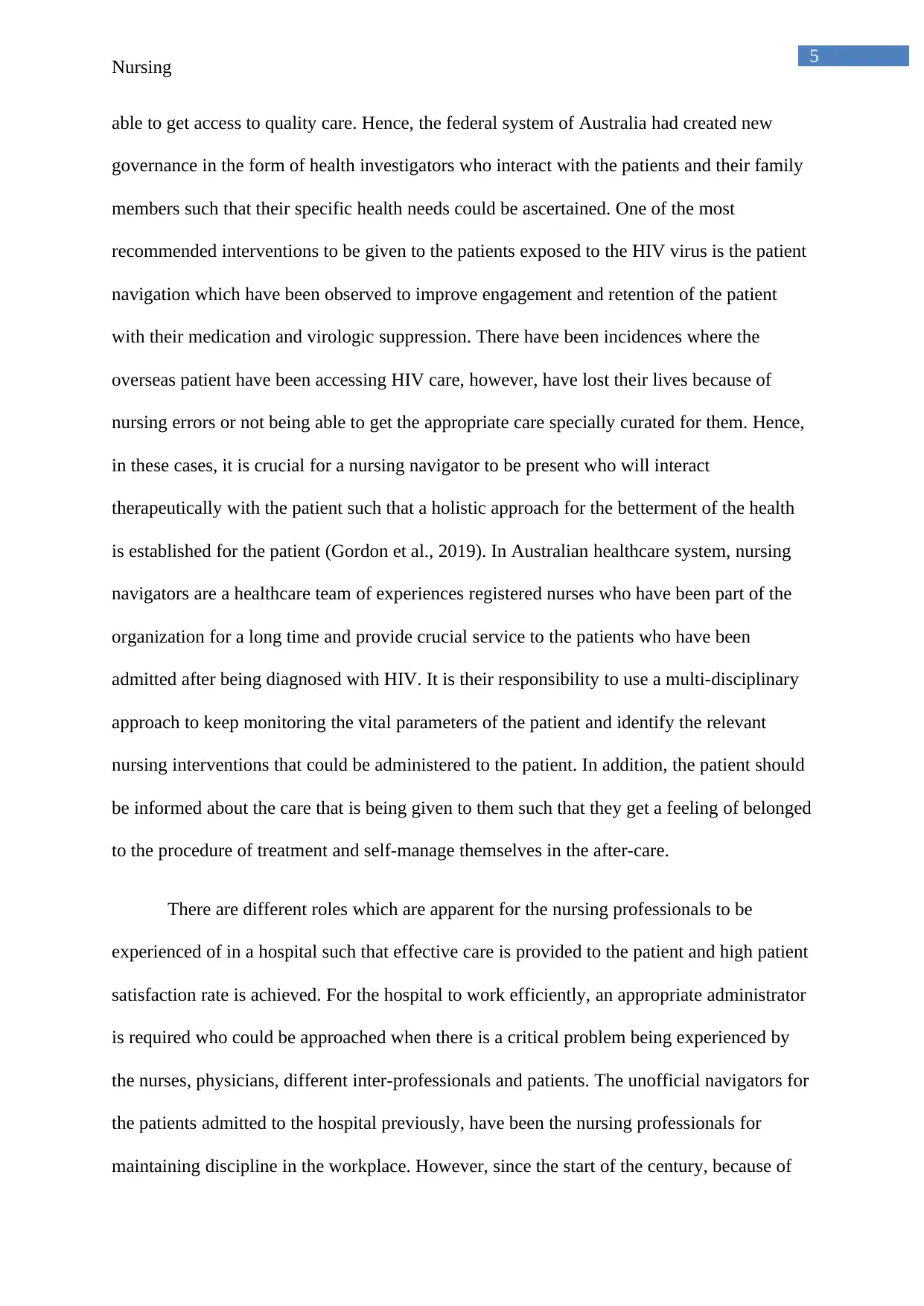
5
Nursing
able to get access to quality care. Hence, the federal system of Australia had created new
governance in the form of health investigators who interact with the patients and their family
members such that their specific health needs could be ascertained. One of the most
recommended interventions to be given to the patients exposed to the HIV virus is the patient
navigation which have been observed to improve engagement and retention of the patient
with their medication and virologic suppression. There have been incidences where the
overseas patient have been accessing HIV care, however, have lost their lives because of
nursing errors or not being able to get the appropriate care specially curated for them. Hence,
in these cases, it is crucial for a nursing navigator to be present who will interact
therapeutically with the patient such that a holistic approach for the betterment of the health
is established for the patient (Gordon et al., 2019). In Australian healthcare system, nursing
navigators are a healthcare team of experiences registered nurses who have been part of the
organization for a long time and provide crucial service to the patients who have been
admitted after being diagnosed with HIV. It is their responsibility to use a multi-disciplinary
approach to keep monitoring the vital parameters of the patient and identify the relevant
nursing interventions that could be administered to the patient. In addition, the patient should
be informed about the care that is being given to them such that they get a feeling of belonged
to the procedure of treatment and self-manage themselves in the after-care.
There are different roles which are apparent for the nursing professionals to be
experienced of in a hospital such that effective care is provided to the patient and high patient
satisfaction rate is achieved. For the hospital to work efficiently, an appropriate administrator
is required who could be approached when there is a critical problem being experienced by
the nurses, physicians, different inter-professionals and patients. The unofficial navigators for
the patients admitted to the hospital previously, have been the nursing professionals for
maintaining discipline in the workplace. However, since the start of the century, because of
Nursing
able to get access to quality care. Hence, the federal system of Australia had created new
governance in the form of health investigators who interact with the patients and their family
members such that their specific health needs could be ascertained. One of the most
recommended interventions to be given to the patients exposed to the HIV virus is the patient
navigation which have been observed to improve engagement and retention of the patient
with their medication and virologic suppression. There have been incidences where the
overseas patient have been accessing HIV care, however, have lost their lives because of
nursing errors or not being able to get the appropriate care specially curated for them. Hence,
in these cases, it is crucial for a nursing navigator to be present who will interact
therapeutically with the patient such that a holistic approach for the betterment of the health
is established for the patient (Gordon et al., 2019). In Australian healthcare system, nursing
navigators are a healthcare team of experiences registered nurses who have been part of the
organization for a long time and provide crucial service to the patients who have been
admitted after being diagnosed with HIV. It is their responsibility to use a multi-disciplinary
approach to keep monitoring the vital parameters of the patient and identify the relevant
nursing interventions that could be administered to the patient. In addition, the patient should
be informed about the care that is being given to them such that they get a feeling of belonged
to the procedure of treatment and self-manage themselves in the after-care.
There are different roles which are apparent for the nursing professionals to be
experienced of in a hospital such that effective care is provided to the patient and high patient
satisfaction rate is achieved. For the hospital to work efficiently, an appropriate administrator
is required who could be approached when there is a critical problem being experienced by
the nurses, physicians, different inter-professionals and patients. The unofficial navigators for
the patients admitted to the hospital previously, have been the nursing professionals for
maintaining discipline in the workplace. However, since the start of the century, because of
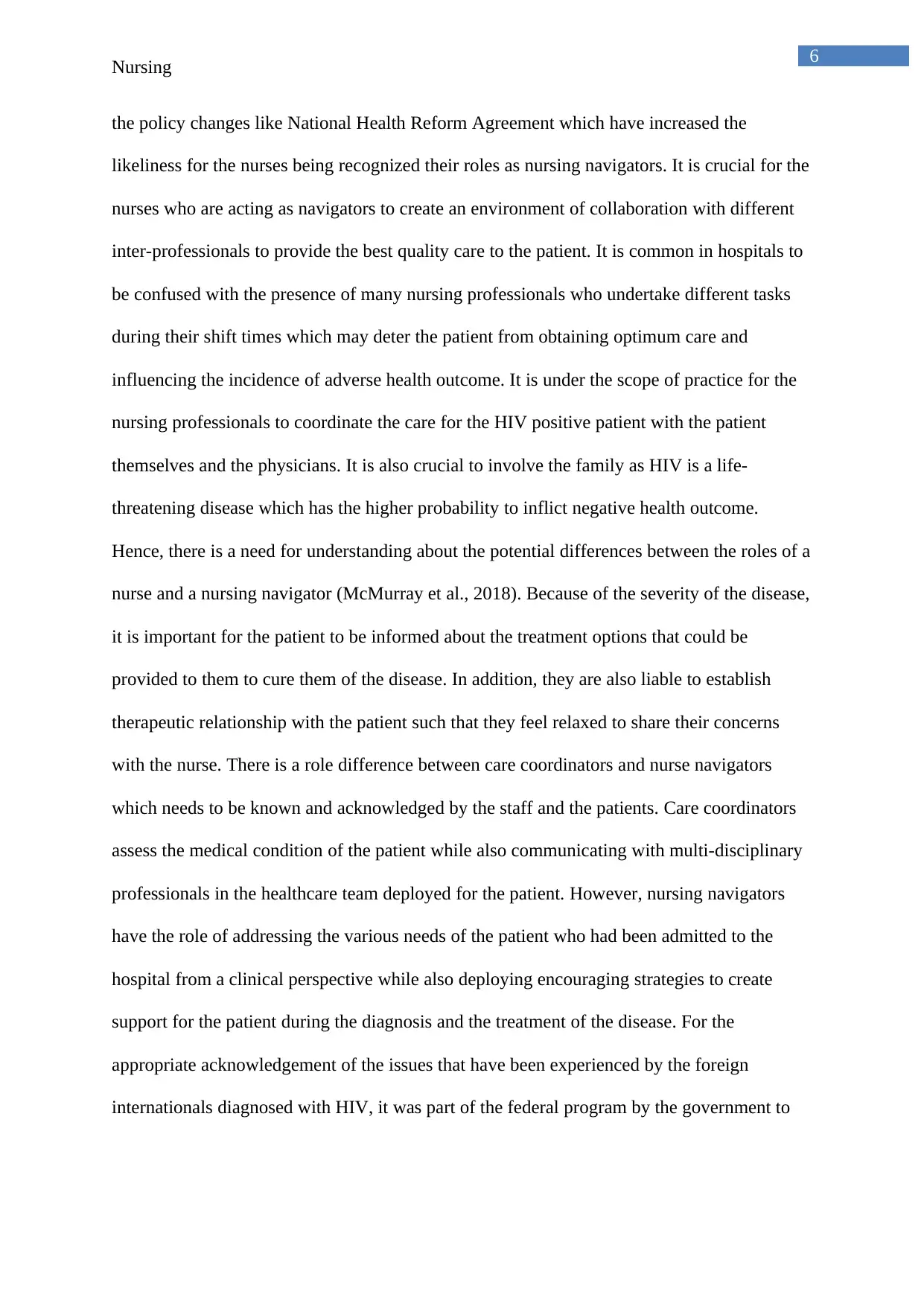
6
Nursing
the policy changes like National Health Reform Agreement which have increased the
likeliness for the nurses being recognized their roles as nursing navigators. It is crucial for the
nurses who are acting as navigators to create an environment of collaboration with different
inter-professionals to provide the best quality care to the patient. It is common in hospitals to
be confused with the presence of many nursing professionals who undertake different tasks
during their shift times which may deter the patient from obtaining optimum care and
influencing the incidence of adverse health outcome. It is under the scope of practice for the
nursing professionals to coordinate the care for the HIV positive patient with the patient
themselves and the physicians. It is also crucial to involve the family as HIV is a life-
threatening disease which has the higher probability to inflict negative health outcome.
Hence, there is a need for understanding about the potential differences between the roles of a
nurse and a nursing navigator (McMurray et al., 2018). Because of the severity of the disease,
it is important for the patient to be informed about the treatment options that could be
provided to them to cure them of the disease. In addition, they are also liable to establish
therapeutic relationship with the patient such that they feel relaxed to share their concerns
with the nurse. There is a role difference between care coordinators and nurse navigators
which needs to be known and acknowledged by the staff and the patients. Care coordinators
assess the medical condition of the patient while also communicating with multi-disciplinary
professionals in the healthcare team deployed for the patient. However, nursing navigators
have the role of addressing the various needs of the patient who had been admitted to the
hospital from a clinical perspective while also deploying encouraging strategies to create
support for the patient during the diagnosis and the treatment of the disease. For the
appropriate acknowledgement of the issues that have been experienced by the foreign
internationals diagnosed with HIV, it was part of the federal program by the government to
Nursing
the policy changes like National Health Reform Agreement which have increased the
likeliness for the nurses being recognized their roles as nursing navigators. It is crucial for the
nurses who are acting as navigators to create an environment of collaboration with different
inter-professionals to provide the best quality care to the patient. It is common in hospitals to
be confused with the presence of many nursing professionals who undertake different tasks
during their shift times which may deter the patient from obtaining optimum care and
influencing the incidence of adverse health outcome. It is under the scope of practice for the
nursing professionals to coordinate the care for the HIV positive patient with the patient
themselves and the physicians. It is also crucial to involve the family as HIV is a life-
threatening disease which has the higher probability to inflict negative health outcome.
Hence, there is a need for understanding about the potential differences between the roles of a
nurse and a nursing navigator (McMurray et al., 2018). Because of the severity of the disease,
it is important for the patient to be informed about the treatment options that could be
provided to them to cure them of the disease. In addition, they are also liable to establish
therapeutic relationship with the patient such that they feel relaxed to share their concerns
with the nurse. There is a role difference between care coordinators and nurse navigators
which needs to be known and acknowledged by the staff and the patients. Care coordinators
assess the medical condition of the patient while also communicating with multi-disciplinary
professionals in the healthcare team deployed for the patient. However, nursing navigators
have the role of addressing the various needs of the patient who had been admitted to the
hospital from a clinical perspective while also deploying encouraging strategies to create
support for the patient during the diagnosis and the treatment of the disease. For the
appropriate acknowledgement of the issues that have been experienced by the foreign
internationals diagnosed with HIV, it was part of the federal program by the government to
Paraphrase This Document
Need a fresh take? Get an instant paraphrase of this document with our AI Paraphraser
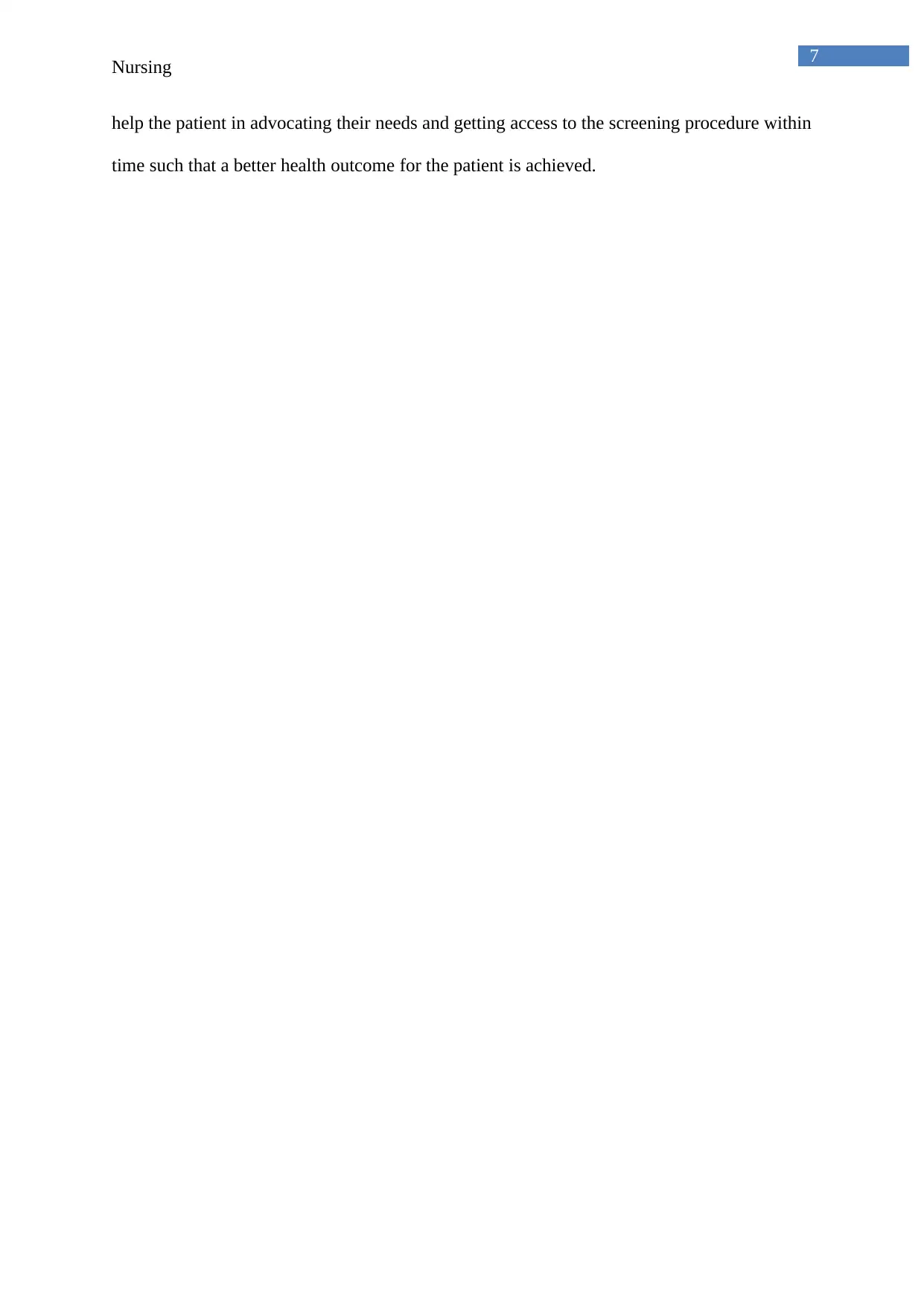
7
Nursing
help the patient in advocating their needs and getting access to the screening procedure within
time such that a better health outcome for the patient is achieved.
Nursing
help the patient in advocating their needs and getting access to the screening procedure within
time such that a better health outcome for the patient is achieved.
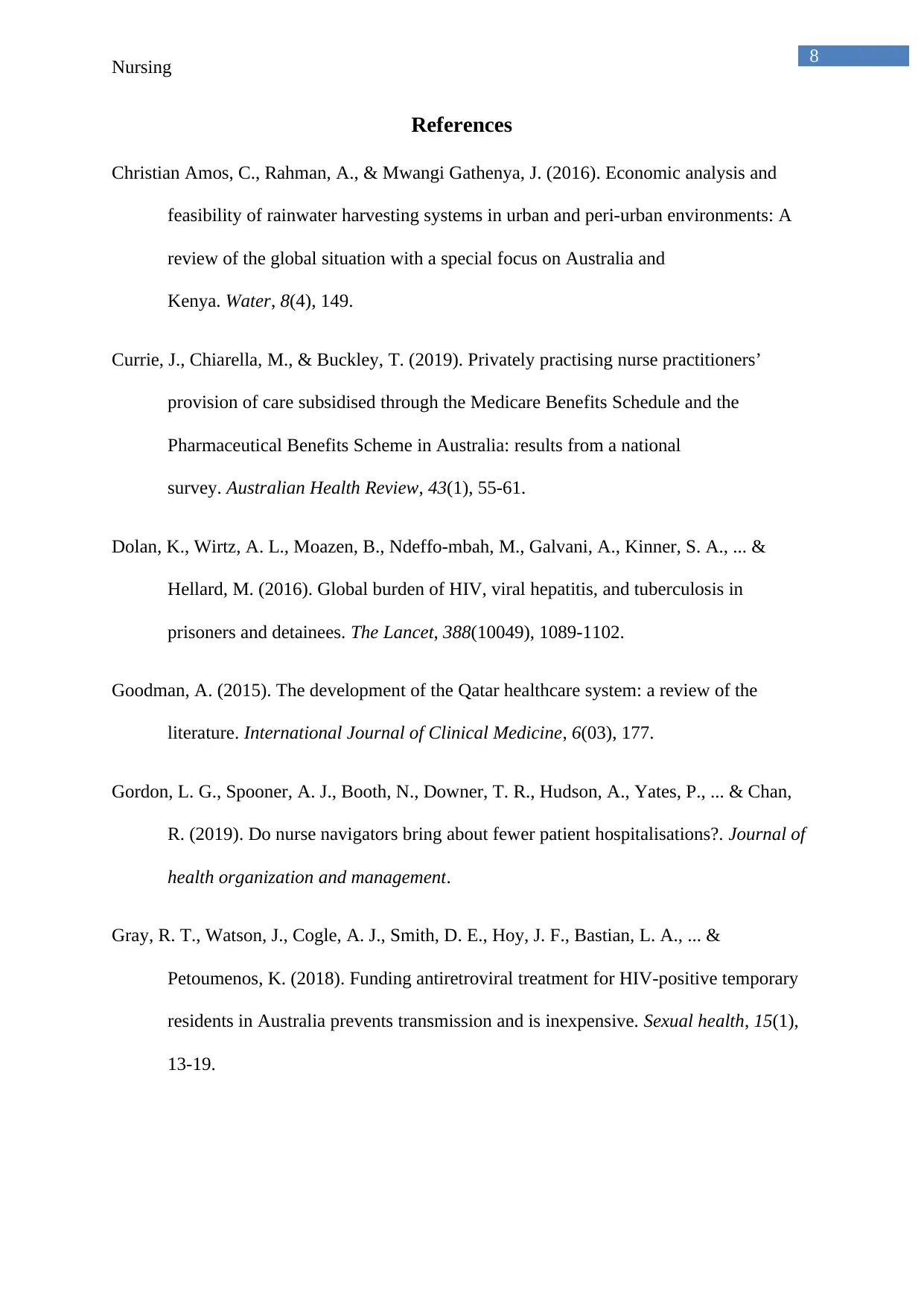
8
Nursing
References
Christian Amos, C., Rahman, A., & Mwangi Gathenya, J. (2016). Economic analysis and
feasibility of rainwater harvesting systems in urban and peri-urban environments: A
review of the global situation with a special focus on Australia and
Kenya. Water, 8(4), 149.
Currie, J., Chiarella, M., & Buckley, T. (2019). Privately practising nurse practitioners’
provision of care subsidised through the Medicare Benefits Schedule and the
Pharmaceutical Benefits Scheme in Australia: results from a national
survey. Australian Health Review, 43(1), 55-61.
Dolan, K., Wirtz, A. L., Moazen, B., Ndeffo-mbah, M., Galvani, A., Kinner, S. A., ... &
Hellard, M. (2016). Global burden of HIV, viral hepatitis, and tuberculosis in
prisoners and detainees. The Lancet, 388(10049), 1089-1102.
Goodman, A. (2015). The development of the Qatar healthcare system: a review of the
literature. International Journal of Clinical Medicine, 6(03), 177.
Gordon, L. G., Spooner, A. J., Booth, N., Downer, T. R., Hudson, A., Yates, P., ... & Chan,
R. (2019). Do nurse navigators bring about fewer patient hospitalisations?. Journal of
health organization and management.
Gray, R. T., Watson, J., Cogle, A. J., Smith, D. E., Hoy, J. F., Bastian, L. A., ... &
Petoumenos, K. (2018). Funding antiretroviral treatment for HIV-positive temporary
residents in Australia prevents transmission and is inexpensive. Sexual health, 15(1),
13-19.
Nursing
References
Christian Amos, C., Rahman, A., & Mwangi Gathenya, J. (2016). Economic analysis and
feasibility of rainwater harvesting systems in urban and peri-urban environments: A
review of the global situation with a special focus on Australia and
Kenya. Water, 8(4), 149.
Currie, J., Chiarella, M., & Buckley, T. (2019). Privately practising nurse practitioners’
provision of care subsidised through the Medicare Benefits Schedule and the
Pharmaceutical Benefits Scheme in Australia: results from a national
survey. Australian Health Review, 43(1), 55-61.
Dolan, K., Wirtz, A. L., Moazen, B., Ndeffo-mbah, M., Galvani, A., Kinner, S. A., ... &
Hellard, M. (2016). Global burden of HIV, viral hepatitis, and tuberculosis in
prisoners and detainees. The Lancet, 388(10049), 1089-1102.
Goodman, A. (2015). The development of the Qatar healthcare system: a review of the
literature. International Journal of Clinical Medicine, 6(03), 177.
Gordon, L. G., Spooner, A. J., Booth, N., Downer, T. R., Hudson, A., Yates, P., ... & Chan,
R. (2019). Do nurse navigators bring about fewer patient hospitalisations?. Journal of
health organization and management.
Gray, R. T., Watson, J., Cogle, A. J., Smith, D. E., Hoy, J. F., Bastian, L. A., ... &
Petoumenos, K. (2018). Funding antiretroviral treatment for HIV-positive temporary
residents in Australia prevents transmission and is inexpensive. Sexual health, 15(1),
13-19.
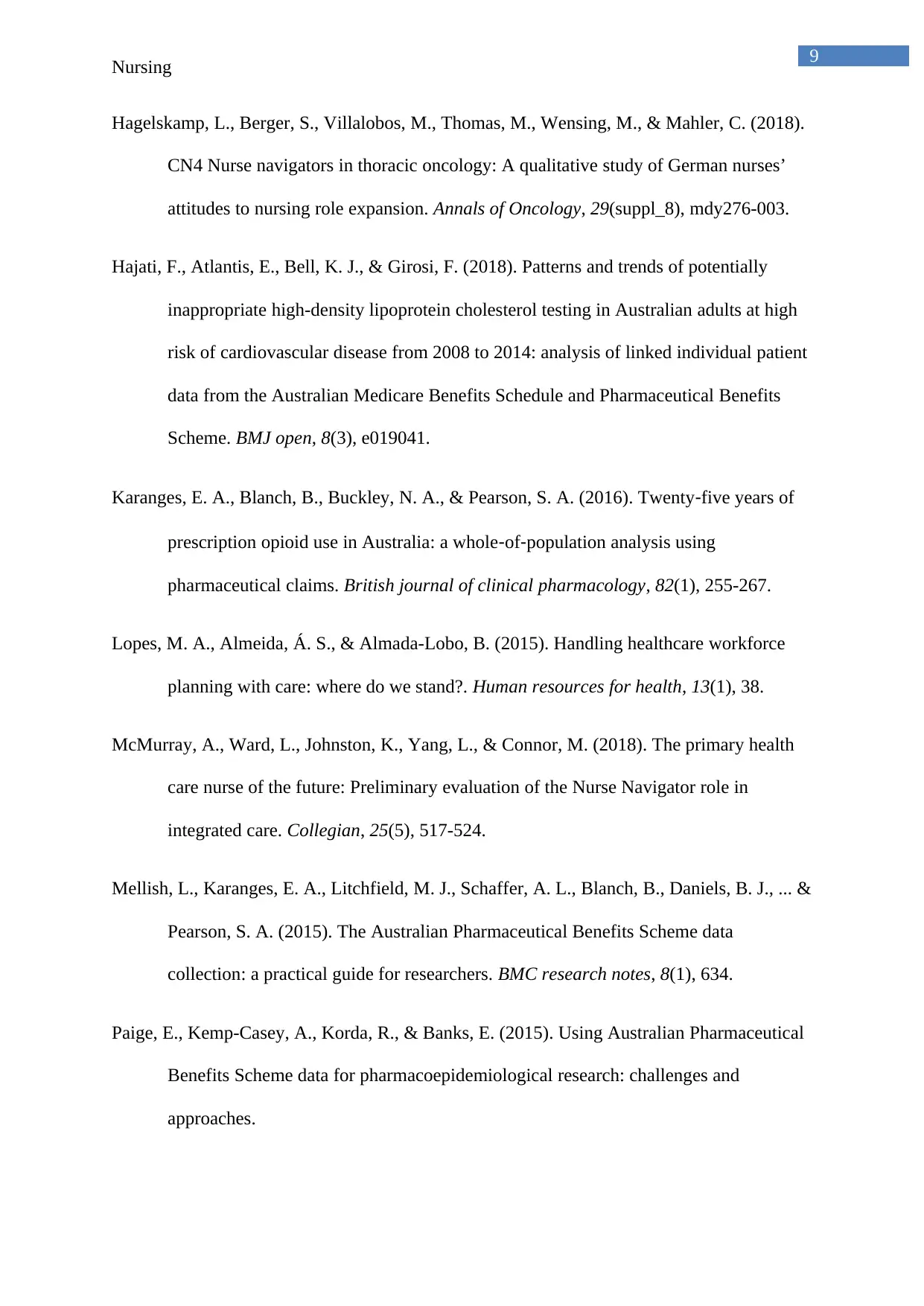
9
Nursing
Hagelskamp, L., Berger, S., Villalobos, M., Thomas, M., Wensing, M., & Mahler, C. (2018).
CN4 Nurse navigators in thoracic oncology: A qualitative study of German nurses’
attitudes to nursing role expansion. Annals of Oncology, 29(suppl_8), mdy276-003.
Hajati, F., Atlantis, E., Bell, K. J., & Girosi, F. (2018). Patterns and trends of potentially
inappropriate high-density lipoprotein cholesterol testing in Australian adults at high
risk of cardiovascular disease from 2008 to 2014: analysis of linked individual patient
data from the Australian Medicare Benefits Schedule and Pharmaceutical Benefits
Scheme. BMJ open, 8(3), e019041.
Karanges, E. A., Blanch, B., Buckley, N. A., & Pearson, S. A. (2016). Twenty‐five years of
prescription opioid use in Australia: a whole‐of‐population analysis using
pharmaceutical claims. British journal of clinical pharmacology, 82(1), 255-267.
Lopes, M. A., Almeida, Á. S., & Almada-Lobo, B. (2015). Handling healthcare workforce
planning with care: where do we stand?. Human resources for health, 13(1), 38.
McMurray, A., Ward, L., Johnston, K., Yang, L., & Connor, M. (2018). The primary health
care nurse of the future: Preliminary evaluation of the Nurse Navigator role in
integrated care. Collegian, 25(5), 517-524.
Mellish, L., Karanges, E. A., Litchfield, M. J., Schaffer, A. L., Blanch, B., Daniels, B. J., ... &
Pearson, S. A. (2015). The Australian Pharmaceutical Benefits Scheme data
collection: a practical guide for researchers. BMC research notes, 8(1), 634.
Paige, E., Kemp-Casey, A., Korda, R., & Banks, E. (2015). Using Australian Pharmaceutical
Benefits Scheme data for pharmacoepidemiological research: challenges and
approaches.
Nursing
Hagelskamp, L., Berger, S., Villalobos, M., Thomas, M., Wensing, M., & Mahler, C. (2018).
CN4 Nurse navigators in thoracic oncology: A qualitative study of German nurses’
attitudes to nursing role expansion. Annals of Oncology, 29(suppl_8), mdy276-003.
Hajati, F., Atlantis, E., Bell, K. J., & Girosi, F. (2018). Patterns and trends of potentially
inappropriate high-density lipoprotein cholesterol testing in Australian adults at high
risk of cardiovascular disease from 2008 to 2014: analysis of linked individual patient
data from the Australian Medicare Benefits Schedule and Pharmaceutical Benefits
Scheme. BMJ open, 8(3), e019041.
Karanges, E. A., Blanch, B., Buckley, N. A., & Pearson, S. A. (2016). Twenty‐five years of
prescription opioid use in Australia: a whole‐of‐population analysis using
pharmaceutical claims. British journal of clinical pharmacology, 82(1), 255-267.
Lopes, M. A., Almeida, Á. S., & Almada-Lobo, B. (2015). Handling healthcare workforce
planning with care: where do we stand?. Human resources for health, 13(1), 38.
McMurray, A., Ward, L., Johnston, K., Yang, L., & Connor, M. (2018). The primary health
care nurse of the future: Preliminary evaluation of the Nurse Navigator role in
integrated care. Collegian, 25(5), 517-524.
Mellish, L., Karanges, E. A., Litchfield, M. J., Schaffer, A. L., Blanch, B., Daniels, B. J., ... &
Pearson, S. A. (2015). The Australian Pharmaceutical Benefits Scheme data
collection: a practical guide for researchers. BMC research notes, 8(1), 634.
Paige, E., Kemp-Casey, A., Korda, R., & Banks, E. (2015). Using Australian Pharmaceutical
Benefits Scheme data for pharmacoepidemiological research: challenges and
approaches.
Secure Best Marks with AI Grader
Need help grading? Try our AI Grader for instant feedback on your assignments.
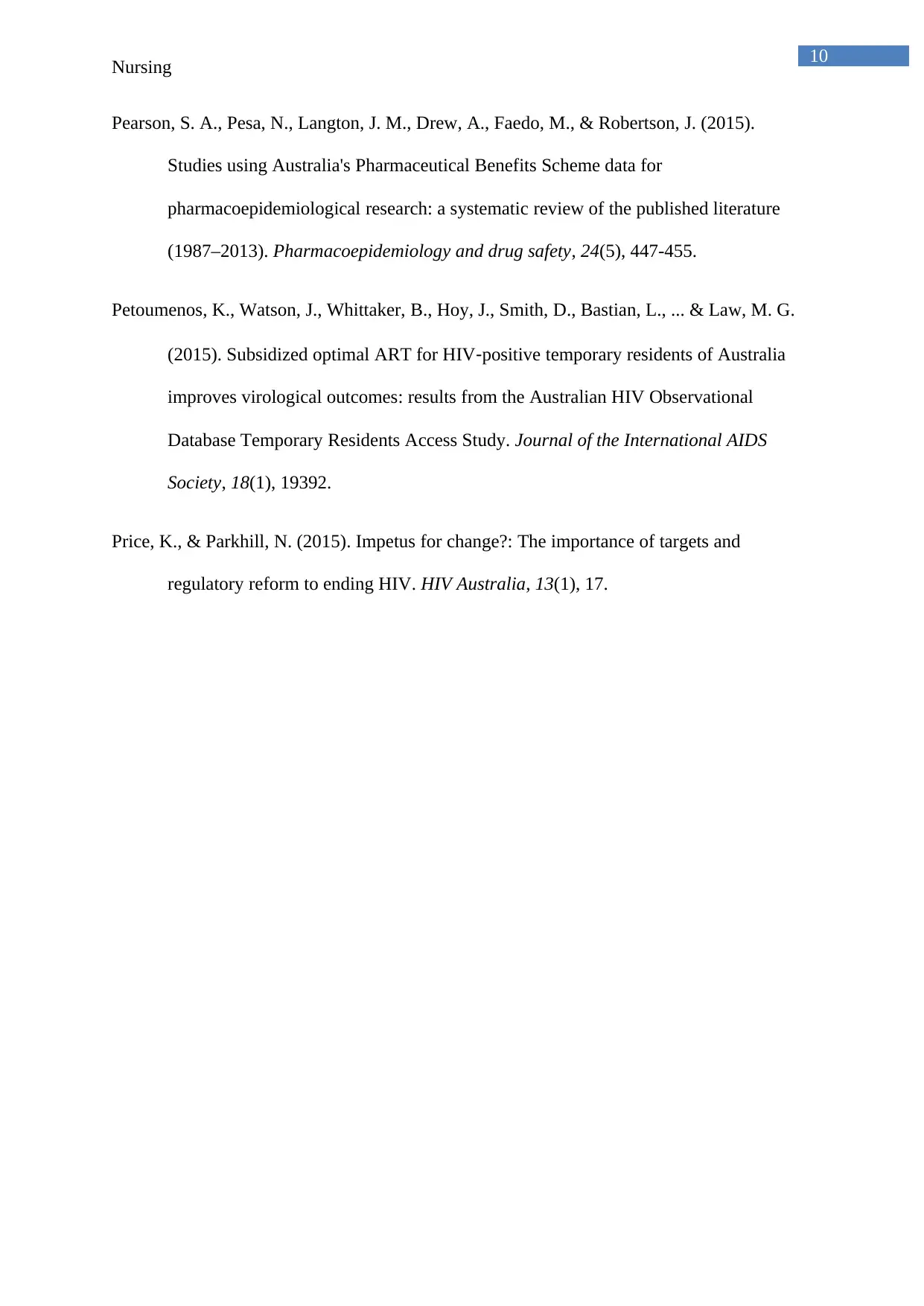
10
Nursing
Pearson, S. A., Pesa, N., Langton, J. M., Drew, A., Faedo, M., & Robertson, J. (2015).
Studies using Australia's Pharmaceutical Benefits Scheme data for
pharmacoepidemiological research: a systematic review of the published literature
(1987–2013). Pharmacoepidemiology and drug safety, 24(5), 447-455.
Petoumenos, K., Watson, J., Whittaker, B., Hoy, J., Smith, D., Bastian, L., ... & Law, M. G.
(2015). Subsidized optimal ART for HIV‐positive temporary residents of Australia
improves virological outcomes: results from the Australian HIV Observational
Database Temporary Residents Access Study. Journal of the International AIDS
Society, 18(1), 19392.
Price, K., & Parkhill, N. (2015). Impetus for change?: The importance of targets and
regulatory reform to ending HIV. HIV Australia, 13(1), 17.
Nursing
Pearson, S. A., Pesa, N., Langton, J. M., Drew, A., Faedo, M., & Robertson, J. (2015).
Studies using Australia's Pharmaceutical Benefits Scheme data for
pharmacoepidemiological research: a systematic review of the published literature
(1987–2013). Pharmacoepidemiology and drug safety, 24(5), 447-455.
Petoumenos, K., Watson, J., Whittaker, B., Hoy, J., Smith, D., Bastian, L., ... & Law, M. G.
(2015). Subsidized optimal ART for HIV‐positive temporary residents of Australia
improves virological outcomes: results from the Australian HIV Observational
Database Temporary Residents Access Study. Journal of the International AIDS
Society, 18(1), 19392.
Price, K., & Parkhill, N. (2015). Impetus for change?: The importance of targets and
regulatory reform to ending HIV. HIV Australia, 13(1), 17.
1 out of 11
Related Documents
Your All-in-One AI-Powered Toolkit for Academic Success.
+13062052269
info@desklib.com
Available 24*7 on WhatsApp / Email
![[object Object]](/_next/static/media/star-bottom.7253800d.svg)
Unlock your academic potential
© 2024 | Zucol Services PVT LTD | All rights reserved.


